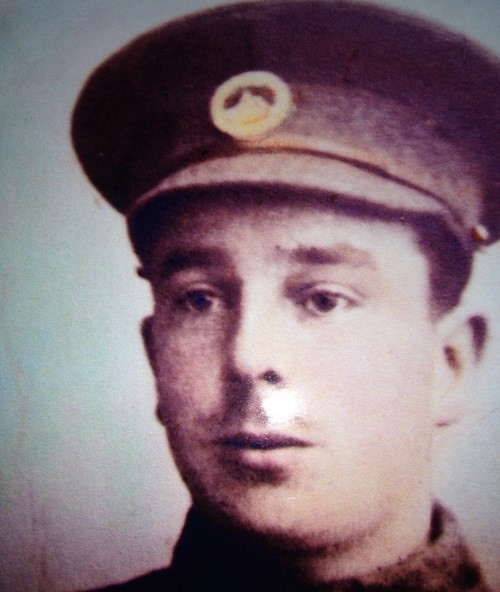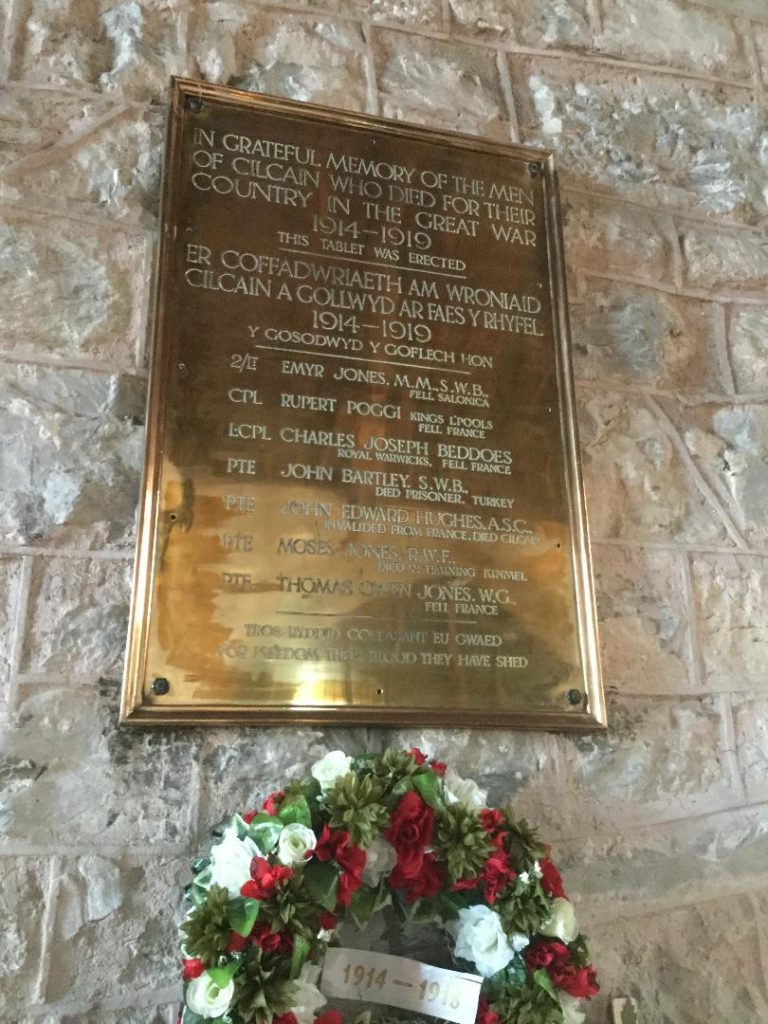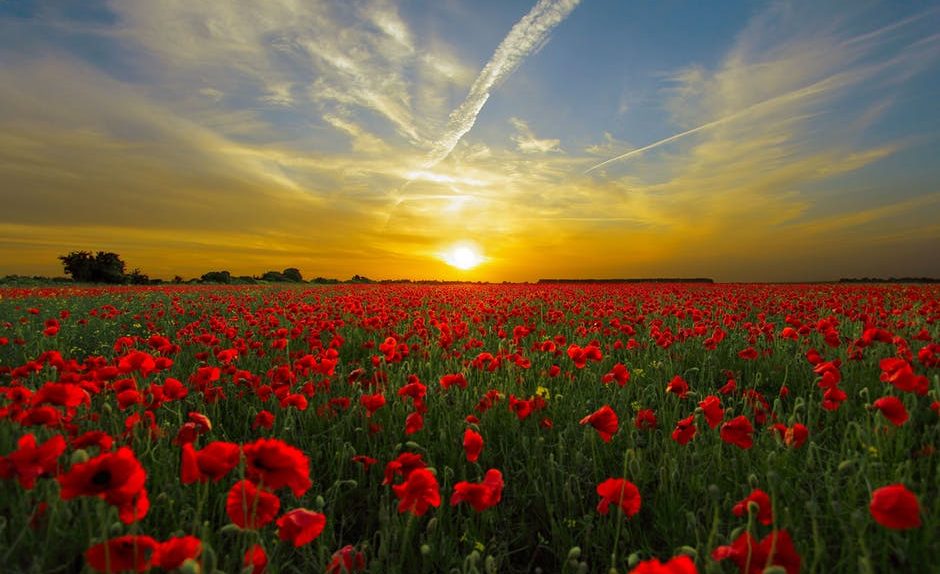It’s 11.45 pm on November 5th, and I’m letting the dogs out before bedtime. Overhead, captured stars glitter in the brittle clutch of leafless branches, owls hoot across the still and sleeping valley, and a barking dog signals a distant warning.
Earlier this evening, the village held its annual Bonfire Night celebration, an event organised by Cilcain Young Farmers, which has taken place on the Waen field behind the village hall since the mid-1960s. Under the light of a waxing moon the place was alive with the noise of excited youngsters enjoying the thrill of the occasion, the booming and crackling of fireworks, their colours bursting and falling like bright confetti against the blackness of the sky, the leaping flames of the bonfire making the familiar unfamiliar, and the smell of smoke hanging in the cold, night air.
As I turn to go back in, I catch sight of the church tower across the way, and my thoughts turn to another age, to other youngsters of this village for whom bright flashes of exploding light and booming thuds meant something entirely different. These were lads who left to serve their country over 100 years ago, walking away from the peaceful, rolling hills of North East Wales towards the unimaginable filth and horror of war in a foreign land.
Twenty one of them went out, and of these, seven never made it back. In their honour, here is a roll-call of their names:

JOHN BARTLEY The son of John and Frances Grace Bartley of Pentre, Cilcain, John joined the South Wales Borderers as an infantryman in May 1916, and was deployed to Mesopotamia shortly afterwards, where the British and Indian armies were engaged against the Turkish army. Despite initial successes for the combined British and Indian forces, the tide began to turn in favour of the Turks when they reinforced their numbers by 30,000, and the British and Indians eventually surrendered at Kut-al-Amara on 30th April 1917. The 11,800 prisoners captured by the Turks were taken from here on 6th May 1917 to a prisoner of war camp, and seemingly John was among their number. He died on 16th November 1917, at the age of 23, and he was buried at Surdejahan Cemetery, Turkey. His name is recorded at the memorial in Basra, Iraq, which commemorates over 40,500 members of the Commonwealth forces who died in operations in Mesopotamia between 1914 and 1921. Members of the Bartley family still live in and around Cilcain, and John’s name is also recorded on a memorial stone in the graveyard of St. Mary’s Church in the village. This stone takes the form of a crucifix and bears the inscription: “Peace, Perfect Peace”.
CHARLES JOSEPH BEDDOES Charles lived with his family at Glanaber, Pentre, in Cilcain. He enlisted at Birmingham into the 11th Battalion of the Royal Warwickshire Regiment, later being promoted to corporal. He would have fought in the Battle of the Ancre, which was focused on the village of Beaumont-Hamel in France, between 13th and 18th November 1916. This was the final large British attack of the Battle of the Somme of that year, the adverse winter weather forcing a pause until the new year. His was an infantry battalion, and as a corporal he would have led a small platoon of soldiers engaging in trench warfare. He was killed in action on the 14th November 1916. His body lies at Grave B 14, Redan Ridge Cemetery No. 3, Beaumont-Hamel, Somme, France.
JOHN EDWARD HUGHES John was born into a Welsh speaking farming family who lived at one time at Station Lodge, Nannerch. His father, also named John, was employed as a cowman, most probably on the local estate of Penbedw. It seems that John was injured or became ill while serving in France with a Motor Transport Company and was invalided home. The record states that he was discharged from the army on 17th May 1917, and died on 12th June later the same year, although the place or cause of his death is not known; however, his body was probably repatriated. The record was signed by an Elizabeth Williams and the address given was Bryn Celyn, Cilcain, believed to be the farm between Nannerch and Cilcain. The only national record of the death of a person the same name and age as John in 1917 is at South Shields, County Durham, which could have been at a hospital. Unfortunately, no more detail is known at this time.
EMYR G. JONES Emyr was born in Llanasa in 1897, but by 1911 he was living with his mother and father in the Post Office Shop in Cilcain – the house now called Dolwar. At the age of 18, he commenced his service with the South Wales Borderers as an infantry soldier. He joined the 3rd Battalion but was attached to the 7th (Service Battalion). Emyr had three years service and was awarded the Military Medal for bravery at some point earlier in his career when he was still a non-commissioned officer (a soldier of commissioned officer rank would have received the Military ‘Cross’ as distinct from the Military ‘Medal’). Later in his career Emyr received his commission and was promoted to the junior officer rank of 2nd Lieutenant. He would have been an officer at the time of the third Battle of Doiran which was fought on 18th and 19th September 1918, with the Greek and the British armies assaulting the fortified positions of the Bulgarian Army in the hills above Doiran Lake. On 18th September the 7th SWB were part of a larger British force that attacked the difficult Pip Ridge, but the 7th SWB suffered heavy casualties and failed in its attacks. It is likely that Emyr was part of this force when he lost his life. The overall attack failed, with some 7,000 British and Greek casualties, and Emyr was reported missing. His body was never found but his name is listed on the Doiran memorial in Greece.
MOSES JONES Moses was born in 1899 in Llanarmon yn Iâl, but by the time of the 1911 census it seems that he and his older brother, Thomas, had left the family home and were working at Cefn Uchaf farm, Cilcain, although Moses is also recorded as attending school. It would not have been unusual at this time for the boys to be working and living on a nearby farm – Cilcain being only about five miles from Llanarmon yn Iâl. Moses joined the Army as a volunteer aged 18 ½ on 17th February, 1917 at the Wrexham recruiting office, but he sadly died of pneumonia at Kinmel Training Camp, Bodelwyddan, on 13th March. The Register of Soldiers’ Effects on www.ancestry.co.uk, in which the army calculated what monies were owed to a deceased soldier’s family, includes an entry for Moses. It lists family members who shared his money. They were brothers Thomas, Ellis, Edward and John, and sisters Maggie, Sophia, Kate and Amelia. Two half sisters Mary and Jane were also included . They all received the grand sum of 4 shillings and 5 pence each.
THOMAS OWEN JONES Born in 1888 in Toxteth, Liverpool to Welsh parents, Thomas’ war record of 1917 gives the family address as White Cottage, Cilcain, a name the house still bears today. Having joined the 1st battalion Welsh Guards, Thomas was deployed on the western front and as an infantry soldier he would have been engaged in trench warfare. On 1st December 1917, the battalion was supported by one of the first uses of tanks as part of an attacking force against German defensive positions, at a ridge near Gonnelieu, the Somme. During the attack, two thirds of the Guards were brought down by machine gun fire and Thomas was one of the casualties. Although his body has never been found, his memory is commemorated at the Cambrai Memorial, Louverval, panel 3. This memorial commemorates over 7,000 servicemen of the United Kingdom and South Africa who died in the Battle of Cambrai in November and December 1917 and whose graves are not known.
ARTHUR RUPERT POGGI Rupert was born in July 1897 in Waterloo, Lancashire. By the time of the 1911 census he was attending boarding school in Hertfordshire. It was about this time that the family also owned a home in Cilcain, namely, The Nook, Pentre Road, which is still a home in the village today. He joined the 26th Royal Fusiliers 1st London Regiment (infantry) in 1915, and in 1918 he served as a corporal in the western theatre. During the battle of Arras, 29 German divisions were assembled on a 33 mile front from the Somme to Arleux for a general attack on the British Third Army positions, with Arras as the principal objective. Rupert’s battalion was part of the 56th Division, which was part of the British defences. The German attack began on 21st March with a bombardment, followed by an infantry attack on 28th March. Rupert was posted as missing on 24th March 1918, and his death, at the age of 20, was confirmed on 2nd April, 1918, although his body was never found. The losses of the London Regiment in the battle amounted to 1,488 men. Rupert’s heartbroken parents raised a makeshift grave for their son in the graveyard of St. Mary’s Church in Cilcain, for many years laying fresh flowers there.

The memorial plaque at St. Mary’s Church, Cilcain
There is an identical one at Capel Gad in the village
Ahead of Remembrance Sunday, it is fitting to take a moment to reflect on the actions of these local lads who, along with thousands of others from towns and villages all across the country, and of course, other nations, served in this ‘war to end all wars’. They weren’t born to be soldiers. For the most part, they were just ordinary lads, leading largely unremarkable lives. But when the call came, this selfless generation answered it, marching bravely towards one of the largest and deadliest wars ever waged.
With the dogs back in, I take one last look before closing the door. The quiet and the darkness are undisturbed. The towels are up at the White Horse Inn, curtains are closed and blinds drawn down. The church and the chapel resume their sleep of ages, and the Square sits patiently ever looking in on itself. This is the peace our soldiers fought for.
Thank you.
Written at School House, Cilcain, November 2019. I would like to thank local resident, Keith Humphreys, for his patience and help with this article. His excellent and fascinating research for Flintshire War Memorials was my source for the information about the Cilcain soldiers. Thanks too, to Mary Bartley, also of Cilcain, for further information about John Bartley, who was uncle to her late husband, Ralph.

Beautifully written, Sonia.
A really lovely tribute.
Gwen
Thank you so much, Gwen.
so poignant all these years on, and multiply it by all the other small villages and then the towns and cities….
you then get some kind of perspective of the enormity of loss and sacrifice.
Lest we forget.
Thank you, Lyn. Such a terrible, terrible waste of life.
We have no idea what these young men really went through but what we do know is that they did it for all of us ….. and for that reason we should never forget their sacrifice in the face of such horrors.
A thought provoking article.
Thankyou Sonia.
On this memorable day here in the USA and I’m sure around the world too Sonia, your beautiful words and wonderfully fitting tribute to the local heroes who gave their lives for the right to freedom, liberty and justice for all…are simply perfect.
Sonia, I am almost lost for words. This is so beautifully written and I’m sure I am not alone in being moved to tears.
Thank you so much for sharing.
Much love and big hugs, Mary xxxx